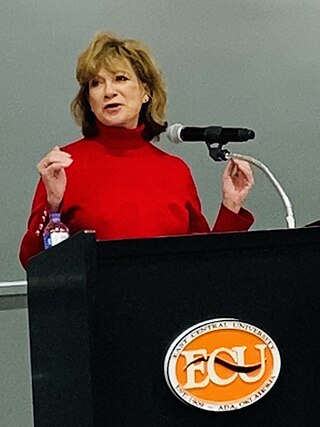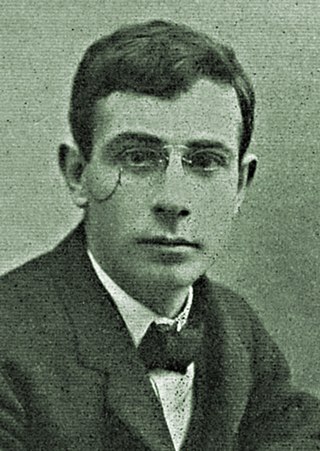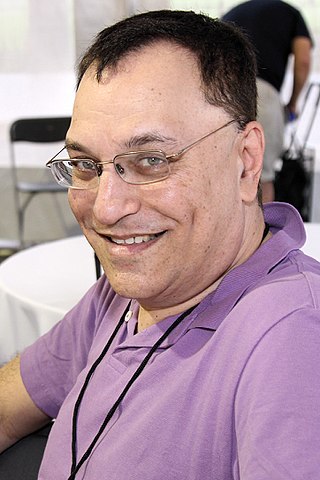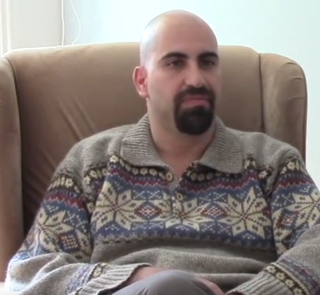Awards
| | This section needs expansion. You can help by adding to it. (December 2018) |
The Gustavus Myers Outstanding Book Awards were literary awards given out each year between 1985 and 2008 by the Gustavus Myers Center for the Study of Bigotry and Human Rights. (Both the awards and the center sometimes had different variations on their names.) Each year ten works were so noted for their treatment of the subjects of bigotry, intolerance, and inequitable power arrangements in society.
The purpose of the awards was initially described as being "an annual award for the best scholarship published on the subject of intolerance in the U.S." [1] This definition was later stated as being for the purpose of "commend[ing] works published in a given year which extend our understanding of the root causes of bigotry and the range of options we as humans have in constructing alternative ways to share power." [2] Each year, ten books were selected to win the award. [3] In some years a list of honorable mentions was also announced. [4]
The center was founded in 1984, but the first awards do not appear to have been given until 1985. Awards were announced on December 10 of each year, to coincide with Human Rights Day. [2] Nominations were solicited, or winners announced, in academic journals such as Women's Studies Quarterly , Hypatia , NWSA Journal , The Radical Teacher , and others. [5] Reviewers were formed on a selection committee to read and report on nominated works. [6] One newspaper columnist who acted as a reviewer reported that he was given a list of books to pick two from, which once received he was to write a one-page review of each. [7] It is not clear what the funding sources were for either the center or its awards process.
The awards received significant visibility, with many authors including having received one in their biographies. [8] In the final year they were given, the books that received awards were said to have been selected from a field of nearly 400 nominations. [9] Recipients of the award include Toni Cade Bambara, Paula Giddings, Joy Harjo, Joe L. Kincheloe, Walter LaFeber, Ruben Martinez, Nell Irvin Painter, Steven Salaita, Shirley R. Steinberg, Clarence Taylor, Harriet A. Washington and Kenji Yoshino.
The awards ceased when the center closed in 2009 due to a lack of funds. [3]
| | This section needs expansion. You can help by adding to it. (December 2018) |

On the Justice of Roosting Chickens: Reflections on the Consequences of U.S. Imperial Arrogance and Criminality is a 2003 book written by Ward Churchill and published by AK Press. The "Roosting Chickens" of the title comes from a 1963 Malcolm X speech about the John F. Kennedy assassination, which the rights activist called "merely a case of 'chickens coming home to roost.'"

Elizabeth Ann Fox-Genovese was an American historian best known for her works on women and society in the Antebellum South. A Marxist early on in her career, she later converted to Roman Catholicism and became a primary voice of the conservative women's movement. She was awarded the National Humanities Medal in 2003.

Rilla Askew is an American novelist and short story writer who was born in Poteau, in the Sans Bois Mountains of southeastern Oklahoma, and grew up in the town of Bartlesville, Oklahoma.
Timothy B. Tyson is an American writer and historian who specializes in the issues of culture, religion, and race associated with the Civil Rights Movement. He is a senior research scholar at the Center for Documentary Studies at Duke University and an adjunct professor of American Studies at the University of North Carolina.
Devon Abbott Mihesuah is a Choctaw historian and writer. She is a former editor of American Indian Quarterly and an enrolled citizen of the Choctaw Nation. She is the Cora Lee Beers Price Professor in the Humanities Program at the University of Kansas. She is the second Native woman to receive a named/distinguished professorship. Her lineage is well-documented in multiple tribal records. Her great, great, great grandfather signed the Treaty of Dancing Rabbit Creek. His son, Charles Wilson, served as sheriff and treasurer of Sugar Loaf County in Moshulatubbee District of the Choctaw Nation. His murder in 1884 is documented in Choctaw Crime and Punishment and Roads of my Relations. Her great-grandfather, Thomas Abbott, created the blueprints for the town of McAlester, Oklahoma and his son, Thomas, served as Chief of Police. They are chronicled in "'Gentleman' Tom Abbott: Middleweight Champion of the Southwest," The Chronicles of Oklahoma 68 : 426–437.
Epifanio San Juan Jr., also known as E. San Juan Jr., is a known Filipino American literary academic, Tagalog writer, Filipino poet, civic intellectual, activist, writer, essayist, video/film maker, editor, and poet whose works related to the Filipino Diaspora in English and Filipino writings have been translated into German, Russian, French, Italian, and Chinese. As an author of books on race and cultural studies, he was a "major influence on the academic world". He was the director of the Philippines Cultural Studies Center in Storrs, Connecticut in the United States. In 1999, San Juan received the Centennial Award for Achievement in Literature from the Cultural Center of the Philippines because of his contributions to Filipino and Filipino American Studies.

Rodolfo "Rudy" Francisco Acuña is an American historian, professor emeritus at California State University, Northridge, and a scholar of Chicano studies. He authored the 1972 book Occupied America: A History of Chicanos, an approach to the history of the Southwestern United States with an emphasis on Mexican Americans. An eighth edition was published in 2014. Acuña has also written for the Los Angeles Times,The Los Angeles Herald-Express, La Opinión, and other newspapers. Acuña is an activist, and he has supported numerous causes of the Chicano Movement. He currently teaches an online history course at California State University, Northridge.
Ralph Edlin Luker was an American historian, teacher, and the author of several books about race, religion and the Civil Rights Movement.
INCITE! Women, Gender Non-Conforming, and Trans people of Color Against Violence, formerly known as INCITE! Women of Color Against Violence, is a United States-based national activist organization of radical feminists of color advancing a movement to end violence against women of color and their communities. INCITE! is organized by a national collective of women of color and has active chapters and affiliates in San Francisco, Washington, D.C., Denver, Albuquerque, Austin, New Orleans, Boston, Philadelphia, New York City, Ann Arbor, Binghamton, Chicago, and a chapter in Toronto, Ontario, Canada. INCITE! was founded in 2000.

Paula Jane Giddings is an American writer, historian, and civil rights activist. She is the author of When and Where I Enter: The Impact of Black Women on Race and Sex in America (1984), In Search of Sisterhood: Delta Sigma Theta and the Challenge of the Black Sorority Movement (1988) and Ida, A Sword Among Lions: Ida B. Wells and the Campaign Against Lynching (2008).

Gustavus Myers was an American journalist and historian who published a series of highly critical and influential studies on the social costs of wealth accumulation.

Kenny Fries is an American memoirist and poet. He is the author of In the Province of the Gods (2017), The History of My Shoes and the Evolution of Darwin's Theory (2007), Body, Remember: A Memoir (1997), and editor of Staring Back: The Disability Experience from the Inside Out (1997). He was commissioned by Houston Grand Opera to write the libretto for The Memory Stone, which premiered in 2013. His books of poems include In the Gardens of Japan (2017), Desert Walking (2006) and Anesthesia (2000). He received a 2009 Creative Capital grant in Innovative Literature, the 2007 Gustavus Myers Outstanding Book Award, the Gregory Kolovakos Award, a Creative Arts Fellowship from the Japan-U.S. Friendship Commission and the National Endowment, and has twice been a Fulbright Scholar. In 2017, he created the Fries Test for disability in fiction and film, akin to the Bechdel Test for women.
Elizabeth Kopelman Borgwardt is an American historian, and lawyer.

Carol Elaine Anderson is an American academic. She is the Charles Howard Candler professor of African American Studies at Emory University. Her research focuses on public policy with regard to race, justice, and equality.
Richard Abanes is an American playwright, composer, lyricist, author, singer, and actor. He has had a life of diverse accomplishments in each of these fields.

Steven Salaita is an American scholar, author and public speaker. He became the center of a controversy when the University of Illinois did not hire him as a professor of American Indian Studies following objections to a series of tweets critical of Israel's bombardment of Gaza in 2014. He also experienced similar controversy during the hiring process at the American University of Beirut in 2016.
Alice Y. Hom is an Asian American LGBTQ community activist and author.

Brenda Elaine Stevenson is an American historian specializing in the history of the Southern United States and African American history, particularly slavery, gender, race and race riots. She is Professor and Nickoll Family Endowed Chair in History and Professor in African-American Studies at the University of California, Los Angeles (UCLA). As of Autumn 2021, she was appointed inaugural Hillary Rodham Clinton Chair of Women's History at St John's College, University of Oxford.
The Gustavus Myers Center for the Study of Bigotry and Human Rights, earlier known as the Gustavus Myers Center for Human Rights or The Gustavus Myers Center for the Study of Human Rights in North America or several other such variations, was an American nonprofit organization that existed from 1984 to 2009. It took its name from American journalist and historian Gustavus Myers and, in particular, from his 1943 work History of Bigotry in the United States. The center was most known for the Gustavus Myers Outstanding Book Award, given out each year to ten books. The award, in the words of the center, "commends works published in a given year which extend our understanding of the root causes of bigotry and the range of options we as humans have in constructing alternative ways to share power."
Becky Thompson is a US-based scholar, human rights activist, cross-cultural trainer, poet and yoga teacher. She is a professor of sociology in the College of Social Sciences, Policy and Practice at Simmons University. She also teaches yoga at the Dorchester YMCA in Boston. Since 2015 she has worked in Greece as a human rights advocate with people from Syria, Afghanistan, Palestine, Somalia.